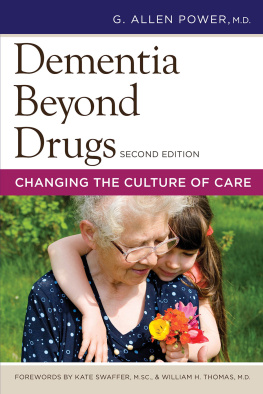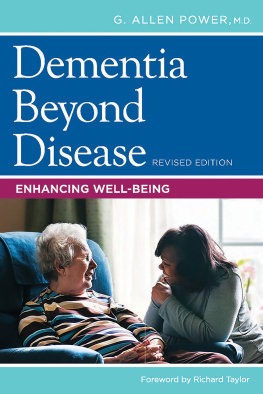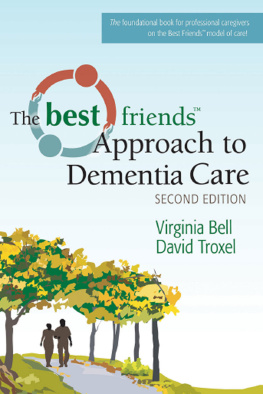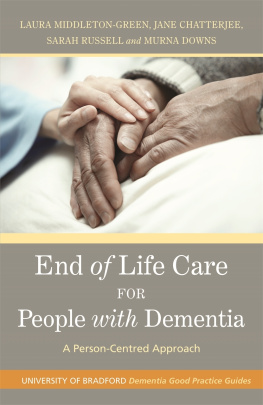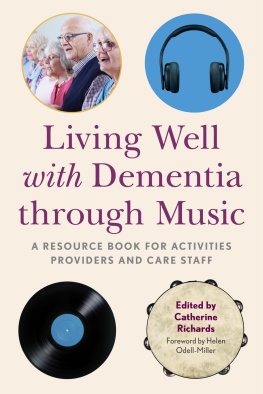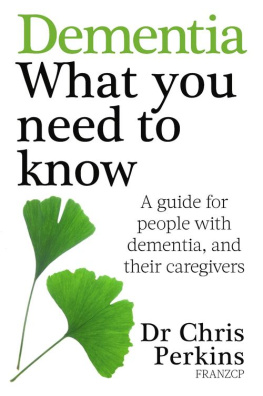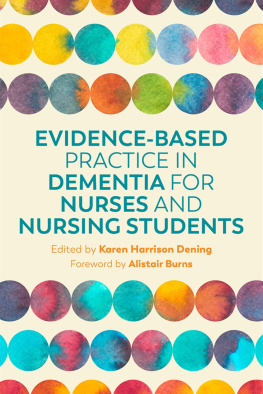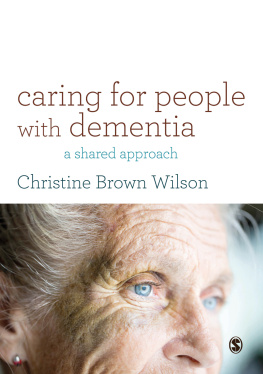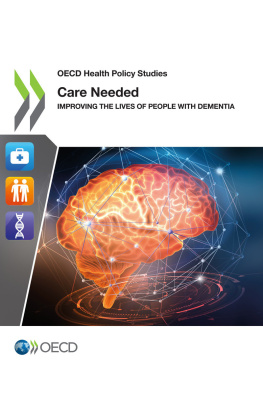Table of Contents
Guide



Health Professions Press, Inc.
Post Office Box 10624
Baltimore, Maryland 21285-0624
www.healthpropress.com
Copyright 2017 by Health Professions Press, Inc.
All rights reserved.
Interior and cover designs by Mindy Dunn.
Typeset by Absolute Service, Inc., Towson, Maryland.
Manufactured in the United States of America by Maple Press, York, Pennsylvania.
The names of the people with dementia in this book have been changed to respect their privacy.
The following materials are reproduced by permission of Jessica Kingsley Publishers: The extracts in Chapters is from Person-Centred Dementia Care: Making Services Better, by Dawn Brooker. Copyright 2007 by Dawn Brooker.
The information provided in this book is in no way meant to substitute for a medical practitioners advice or expert opinion. Readers should consult a medical practitioner if they are interested in more information on dementia. This book is sold without warranties of any kind, express or implied, and the publisher and author disclaim any liability, loss, or damage caused by the contents of this book.
Library of Congress Cataloging-in-Publication Data
Names: Power, G. Allen, author.
Title: Dementia beyond drugs : changing the culture of care / by G. Allen Power ; forewords by William H. Thomas, Kate Swaffer.
Description: Second edition. | Baltimore : Health Professions Press, Inc., [2017] | Includes bibliographical references and index.
Identifiers: LCCN 2016030078 (print) | LCCN 2016030951 (ebook) | ISBN 9781938870644 (pbk.) | ISBN 9781938870675 (epub)
Subjects: | MESH: Dementiatherapy | Dementiapsychology | Nursing Homes | Homes for the Aged | Attitude of Health Personnel | Aged
Classification: LCC RC521 (print) | LCC RC521 (ebook) | NLM WM 220 | DDC 616.8/3dc23
LC record available at https://lccn.loc.gov/2016030078
British Library Cataloguing in Publication data are available from the British Library.
This book is dedicated to my greatest teachersthe people I have known and cared for who have lived with dementia.

When the facts change, I change my mind. What do you do, sir?
John Maynard Keynes
CONTENTS

, by Kate Swaffer, M.Sc.
, by William H. Thomas, M.D.
ABOUT THE AUTHOR


G. Allen Power, M.D., is a board-certified internist and geriatrician and Clinical Associate Professor of Medicine at the University of Rochester, New York. He is a Fellow of the American College of PhysiciansAmerican Society of Internal Medicine, and an international educator on transformational models of care for older adults, particularly those living with changing cognitive abilities.
Dr. Powers first edition of Dementia Beyond Drugs: Changing the Culture of Care was named a 2010 Book of the Year (in Psychiatric/Mental Health Nursing) by the American Journal of Nursing. He served on the technical advisory panel for the U. S. Center for Medicare and Medicaid Services for their national antipsychotic reduction initiative. Dr. Power was interviewed for the film Alive Inside, winner of the Audience Award for Best U.S. Documentary at the 2014 Sundance Film Festival. He also was a member the Scientific Program Committee and a keynote speaker for Alzheimers Disease International Conference 2015 in Perth, Western Australia.
Dr. Power was named one of Five Leaders of Tomorrow by Long-Term Living Magazine in May 2013. His second book, Dementia Beyond Disease: Enhancing Well-Being, was originally published by Health Professions Press in 2014 and was re-released as a revised edition to coincide with the publication of this second edition of Dementia Beyond Drugs.
An accomplished musician and songwriter, Dr. Powers music has been performed on three continents. His song of elder autonomy, If You Dont Mind, was performed by Peter, Paul and Mary, and Walter Cronkite used his song Ill Love You Forever in a 1995 Discovery Channel documentary on American families.
ACKNOWLEDGMENTS

This book has been a long time in the making and it would be impossible to list all of the people who have enriched my journey. Nevertheless, I could not pass up this opportunity to thank several people for their contributions to this project and to the ideas that led me down this path.
I am indebted to Mary Magnus, publications director for Health Professions Press, for embracing a book that challenges much of the prevailing wisdom on dementia. Mary and her staff have been unflagging in their support for this project. Cecilia Gonzlez has patiently guided me through the production process and answered my myriad questions each step of the way. Thanks also to Kaitlin Konecke for her marketing and promotional efforts. My thanks as well to Diane Ersepke and Lisa Rapisarda for their thoughtful copyediting of the first and second editions, respectively, to Mindy Dunn for her striking book design, and to HPP president Melissa Behm for her advocacy and support.
There are no words adequate to thank Bill and Jude Thomas, founders of The Eden Alternative, for their vision, passion, friendship, guidance, and support. They have literally changed my life and my career.
I am also grateful for the support of The Eden Alternative family, who work tirelessly to create a life worth living for our elders and those who care for them. I cannot begin to thank all of the people who have contributed to my understanding of this transformational movement. I will mention a few, however, who have directly educated me on culture change or provided resources for the ideas expressed in this book: Carol Ende, Susan Berta, Nancy Fox, Denise Hyde, Laura Beck, Emi Kiyota, Hilary Lee, Christa Merzeder, Vicki Rosebrook, Dorene Spies, and Jane Verity. A big thank you as well to Sonya Barsness and Karen Stobbe for their help in repackaging my Dementia Beyond Drugs seminar for our CMS national grants.
I am proud to have been a member of the community of St. Johns Home, and I hope this book will serve as a token of my appreciation for the friendship and support I have received over those years. Thanks in particular to Charlie Runyon and Veronica Barber for giving me the resources and support to pursue this path, to my medical colleagues past and present for inspiring and challenging me, and to all of my coworkers who strive every day to create a place of caring and compassion for all.
Heartfelt thanks to friends and colleagues who have read parts of this manuscript at various stages and provided valuable feedback: Mimi DeVinney, Bill Hall, Eileen Hayes-Power, Emi Kiyota, Cathi Laturi, Bob McCann, Christa Merzeder, Ora Power, Tim Quill, Alan Whitney, Carter Catlett Williams, and the late T. Franklin Williams.
Next page
